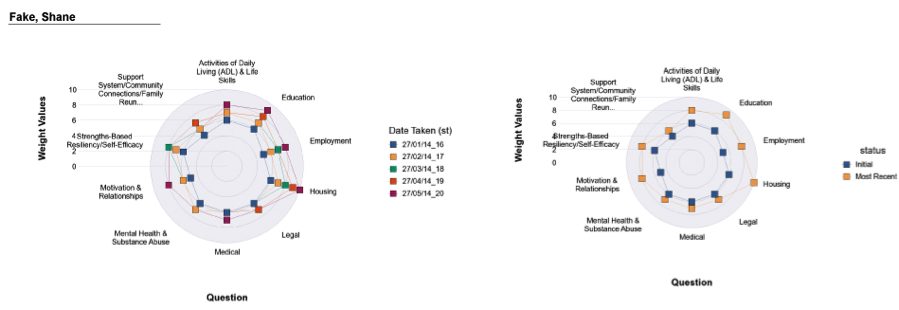Covenant House Toronto uses the Youth Engagement Scale (YES) model to gather information about a youth’s engagement with various factors of the program. YES examines12 different “Points of Service” in a young person’s life using a 10-step scale that captures how engaged they are (actively working to make changes) on that particular issue including school, work, involvement in their program etc. The 10-step scale is linked to the Stage of Change transtheoretical model, which will be discussed in the Theories to Support the Work chapter.
The 12 different Points of Service are: Activities of Daily Living, Housing, Education, Employment, Motivation and Relationships, Support System/Community Connectivity, Strength Based Resiliency/Self-Efficacy, Legal, Medical, Mental Health, Substances and Financial.
According to CHT, in the area of employment for example, a youth being scored as Step 1 or Step 2 would fall into the Pre-Contemplation Stage of Change and their behaviour would include being “Unemployed and not interested in seeking employment, hostile or cold toward idea of employment and rejects offers of employment coaching/assistance”. As the youth moves up the scale and becomes more engaged with this Point of Service their behaviour would transition to a more positive outlook until they are “employed in a sustainable job providing a living income”.
CHT is in the process of rolling out visual tools to help staff and youth see how YES measures their progress. The graphs below are still in development, but provide a sample of how YES can show the growth and progress of each youth.
As these sample graphs show, a youth can progress in many ways. The system allows comparisons between several points (as shown in the charts on the left hand side) or between two specific points in time (as shown in the charts on the right hand side).
“[It] has really helped around just tracking in a better way the impact that we have on young people. We work with young people from 16-24 and sometimes it takes a number of years before you can really see that we’re having an impact. So this tool really helps us to check our progress.” — Carol Howes, Director of Program Services, Covenant House Toronto
The Case Management Team approach is very effective when combined with YES because while one worker might not see a youth’s engagement as very high, another may have had a detailed conversation about that specific factor and so a melding of scores can be obtained.
The YES model can also be used to demonstrate progress to a youth.
It is important to note that with the YES model, and with Outcomes Star described in the next section, progress is not always linear. Youth may make forward progress in Activities of Daily Living but backward progress in Employment. This is understood to be natural and both staff and youth are informed that this should not be seen as a failure in any way.


